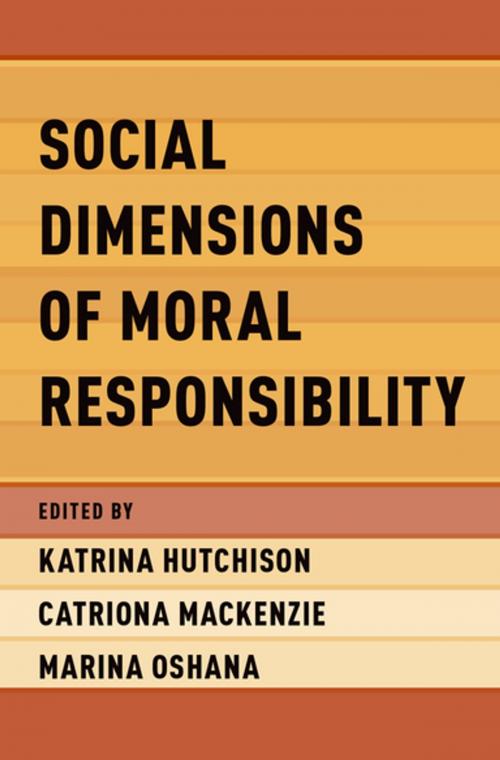Social Dimensions of Moral Responsibility
Nonfiction, Religion & Spirituality, Philosophy, Metaphysics, Ethics & Moral Philosophy| Author: | ISBN: | 9780190874063 | |
| Publisher: | Oxford University Press | Publication: | March 14, 2018 |
| Imprint: | Oxford University Press | Language: | English |
| Author: | |
| ISBN: | 9780190874063 |
| Publisher: | Oxford University Press |
| Publication: | March 14, 2018 |
| Imprint: | Oxford University Press |
| Language: | English |
To what extent are we responsible for our actions? Philosophical theorizing about this question has recently taken a social turn, marking a shift in focus from traditional metaphysical concerns about free will and determinism. Recent theories have attended to the interpersonal dynamics at the heart of moral responsibility practices and the role of the moral environment in scaffolding agency. Yet, the implications of social inequality and the role of social power for our moral responsibility practices remains a surprisingly neglected topic. The conception of agency involved in current approaches to moral responsibility is overly idealized, assuming that our practices involve interactions between equally empowered and situated agents. In twelve new essays and a substantial introduction, this volume systematically challenges this assumption, exploring the impact of social factors such as power relationships and hierarchies, paternalism, socially constructed identities, race, gender and class on moral responsibility. Social factors have bearing on the circumstances in which agents act as well as on the person or people in the position to hold that agent accountable for his or her action. Additionally, social factors bear on the parties who pass judgment on the agent. Leading theorists of moral responsibility, including Michael McKenna, Marina Oshana, and Manuel Vargas, consider the implications of oppression and structural inequality for their respective theories. Neil Levy urges the need to refocus our analyses of the epistemic and control conditions for moral responsibility from individual to socially extended agents. Leading theorists of relational autonomy, including Catriona Mackenzie, Natalie Stoljar and Andrea Westlund develop new insights into the topic of moral responsibility. Other contributors bring debates about moral responsibility into dialogue with recent work in feminist philosophy, social epistemology and social psychology on topics such as epistemic injustice and implicit bias. Collectively, the essays in this volume reorient philosophical debates about moral responsibility in important new directions.
To what extent are we responsible for our actions? Philosophical theorizing about this question has recently taken a social turn, marking a shift in focus from traditional metaphysical concerns about free will and determinism. Recent theories have attended to the interpersonal dynamics at the heart of moral responsibility practices and the role of the moral environment in scaffolding agency. Yet, the implications of social inequality and the role of social power for our moral responsibility practices remains a surprisingly neglected topic. The conception of agency involved in current approaches to moral responsibility is overly idealized, assuming that our practices involve interactions between equally empowered and situated agents. In twelve new essays and a substantial introduction, this volume systematically challenges this assumption, exploring the impact of social factors such as power relationships and hierarchies, paternalism, socially constructed identities, race, gender and class on moral responsibility. Social factors have bearing on the circumstances in which agents act as well as on the person or people in the position to hold that agent accountable for his or her action. Additionally, social factors bear on the parties who pass judgment on the agent. Leading theorists of moral responsibility, including Michael McKenna, Marina Oshana, and Manuel Vargas, consider the implications of oppression and structural inequality for their respective theories. Neil Levy urges the need to refocus our analyses of the epistemic and control conditions for moral responsibility from individual to socially extended agents. Leading theorists of relational autonomy, including Catriona Mackenzie, Natalie Stoljar and Andrea Westlund develop new insights into the topic of moral responsibility. Other contributors bring debates about moral responsibility into dialogue with recent work in feminist philosophy, social epistemology and social psychology on topics such as epistemic injustice and implicit bias. Collectively, the essays in this volume reorient philosophical debates about moral responsibility in important new directions.















